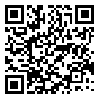BibTeX | RIS | EndNote | Medlars | ProCite | Reference Manager | RefWorks
Send citation to:
URL: http://rjms.iums.ac.ir/article-1-2442-en.html
Background: Autism spectrum disorder (ASD) is characterized by difficulty in the areas of social functioning, communication , and the presence of stereotypic and repetitive behaviors. Video modeling has been found to be an effective procedure for teaching a variety of skills to persons with autism. The purpose of the current study was to investigate the efficacy of video modeling procedure on self-help skills in children with Autism Spectrum Disorders.
Method: Present research is an experimental study of a single case. Four children (2 males & 2 females), ages 6–10, diagnosed with an autism spectrum disorder, participated in this study. A multiple baseline design for each participant and chart analysis for data analysis was used.
Results: Data analysis showed that the video modeling method on self-help skills in subjects effective.
Conclusion: Results showed that likely the video modeling procedure increased self-help skills in children with autism spectrum disorders.





